Welcome to another issue of The Newport Cornucopia where we dig through the newspapers archives for interesting news articles and adverts. All articles are posted verbatim and most headlines are original (headlines in quotes are my own).

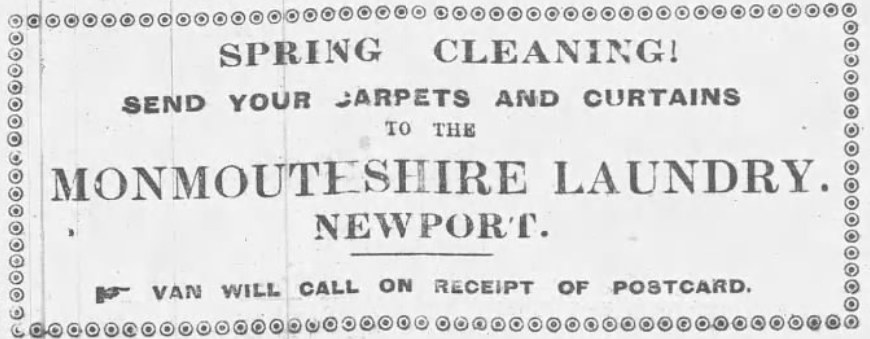

'Bay Windows'
In the Newport (Monmouthshire) Improvement Act 1826, a regulation was in place which ensured that the frontages of buildings were perpendicular to the foundations. This meant that if building owners wanted to install a feature like a bay window, they needed to apply to install one.

In August 1852, an application was made to install a bay window at 22 Stow Hill which was subsequently refused. 22 Stow Hill, along with the building next door is the current location of the Pen and Wig.

Another application in 1867 was refused on High Street during a time when the street was being improved as it could 'neutralise the effect of widening the street by obstructing the light and air'.
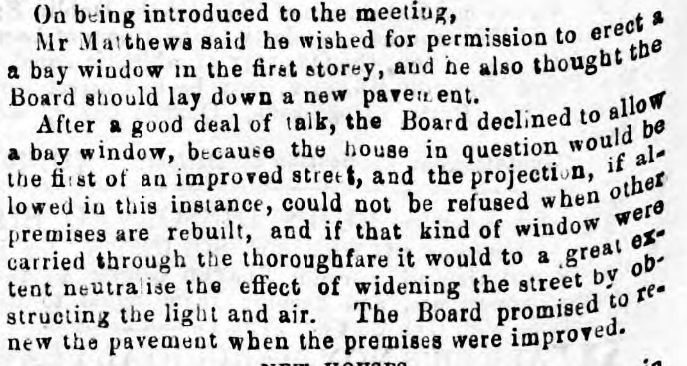
Not all applications are refused and at a council meeting in May 1877 a bay window was approved on Stow Hill.

However, during the same meeting, an upper floor bay window was allowed at the King's Arms in Pill provided the lower one was removed.

Whilst at a Newport Cornucopia History Social, I was looked at the windows of the Pen and Wig and noticed how the bay windows didn't extend the frontage of the building. Installing them in such a way reduces the benefits of them in terms of the extra natural light and views gained so I wondered if it was a way of avoiding to apply to install them?
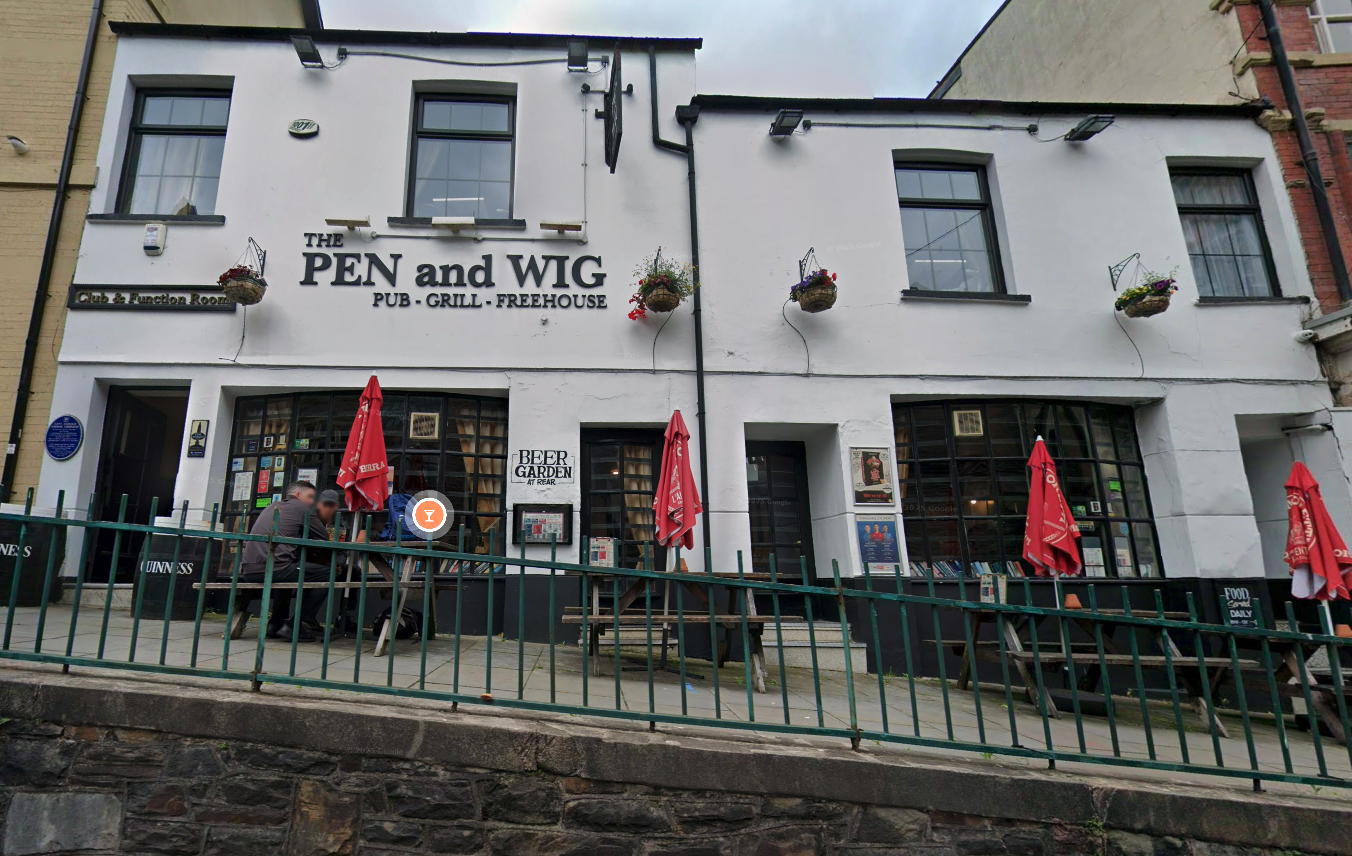
This photograph of 'Cromwell House' shows the two Pen and Wig buildings without the bay windows so I'm not sure when they were installed nor if the rule about building frontages was still in place.



'21 Days Hard Labour for Stealing a Shirt'
George Lane, a labourer, was charged with stealing a flannel shirt, the property of Jane Brown, a widow, of Penhow. The case was proved, and the prisoner sentenced to 21 days' hard labour at Usk.
— Monmouthshire Merlin, 11th April, 1871
'Hawking Fire Screens'
Catherine Holmes, of Newport, was charged with hawking fire screens at Maindee, without having a certificate so to do, on the 10th instant. Fined 2s 6d. or seven days' imprisonment.
— Monmouthshire Merlin, 18th April, 1871
'Obstructing the Highway with a Pig Trough'
John Skinner, of Kemeys Inferior, was charged with obstructing the public highway with a pig's trough, on the 11th inst., at the above parish, at the instance of Robert Bateman, Esq of Bertholey. The charge was withdrawn, the obstruction having been removed.
— Monmouthshire Merlin, 18th April, 1871
'Drunk Man Disturbs Church Congregation'
Charles Daley, drunk and annoying the congregation at Trinity Church, Pill, on Sunday night. He was very violent, and four men were required to remove him from the church.
Prisoner pleaded that he was stupid drunk, and said he should not have gone into the church if he had been sober. The Mayor said it was a very serious offence, and one for which he was liable to two months' hard labour. They must sentence him to 21 day's hard labour, and they wished it to be known that if other similar cases were brought before them they would inflict the full penalty, as they would not have peaceable congregations disturbed. .— Monmouthshire Merlin, 18th April, 1871

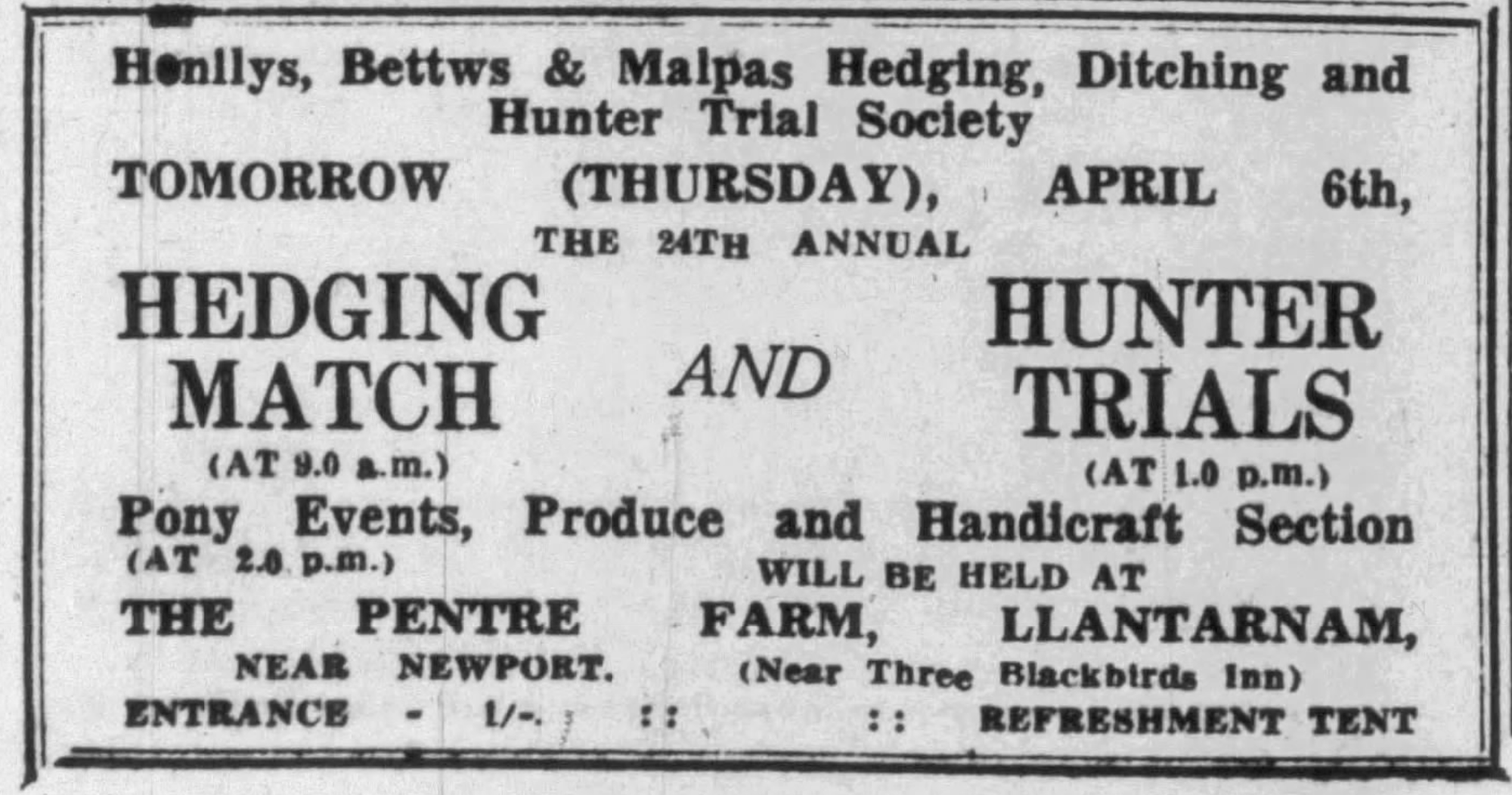

Professor Hagarty Lectures
In April 1871, a series of lectures was delivered at the Town Hall by a Professor Hagarty, an American Phrenologist. The week long series covered a variety of topics and was illustrated by life-size diagrams.
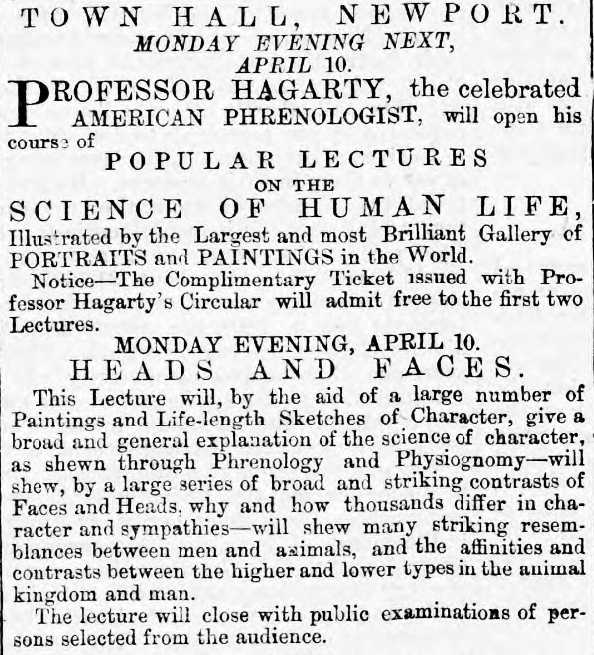
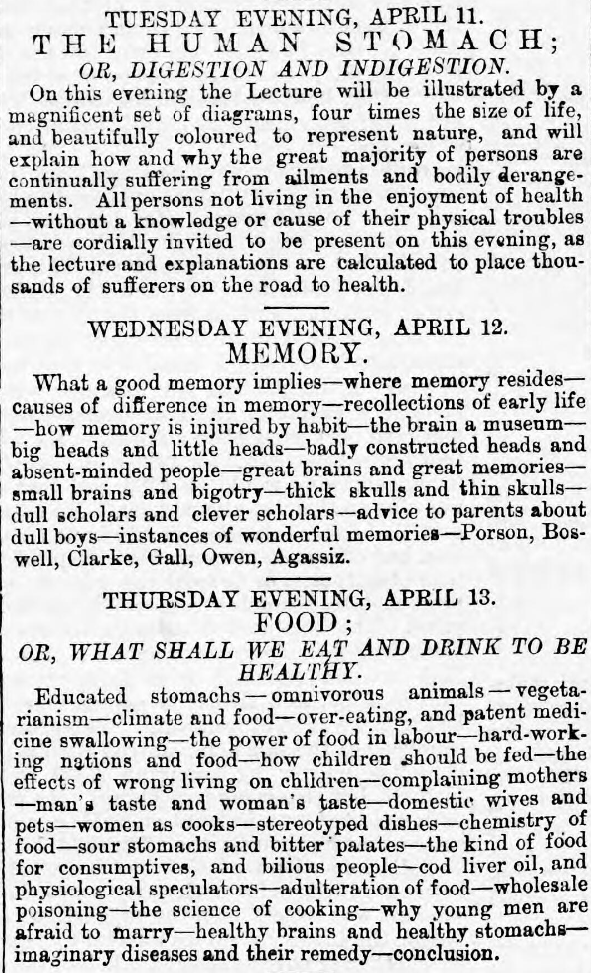
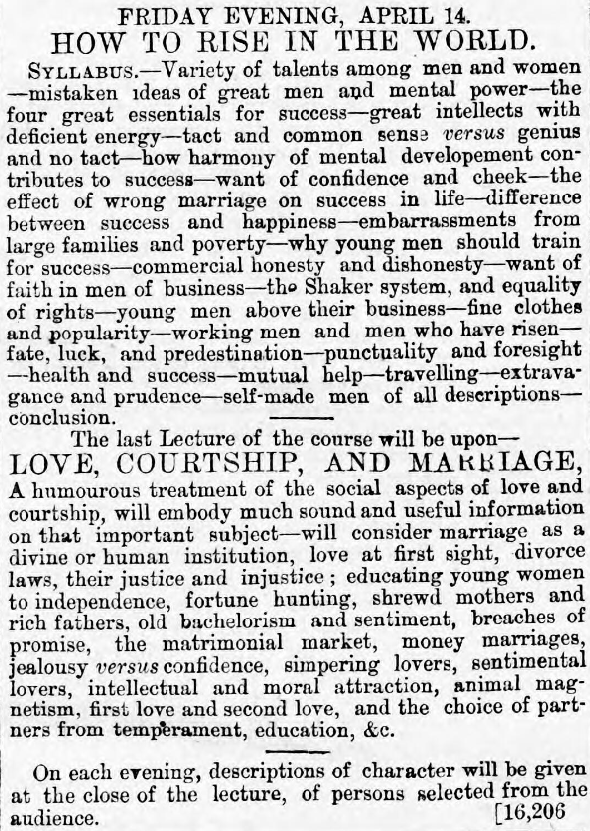

The State of the Old Cemetery
Dr. Davies, medical officer of health, read the following report:
"I beg to report that a complaint having reached me from a gentleman living near the Old Cemetery that he had been lately annoyed by an offensive smell proceeding therefrom, I made enquiry into the matter and found that in the portion of the Cemetery lying at the back of Stow-hill and immediately adjoining Jones-street, several new graves bad been dug within about eighteen inches of each other.
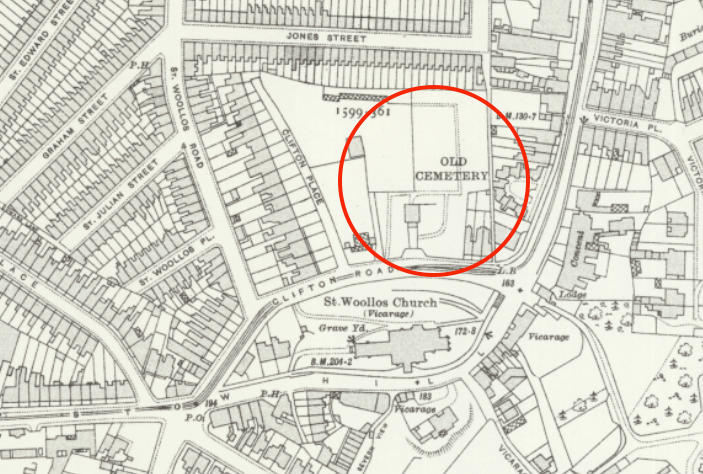
"They are cheap graves, without name or memorial, and several bodies are buried in each, as many as four adults, or from six to eight children.
"They are excavated to a depth of ten feet, so that when they contain so many coffins, the uppermost cannot be very far from the surface.
"The ground is wet and undrained, and when a new grave is dug it forms a catch-pit, and a quantity of foul water drains into it from the adjoining graves.
"This offensive liquor, charged with animal matter, and evolving putrid gases, has to be bailed out, and is emptied over the surrounding graves. This was found to constitute the nuisance complained of.
"During the month ending March 14th, there were eleven interments in this Cemetery—nine children and two adults.
"At this rate, a considerable number of burials must take place in the course of the year. Apart therefore from the nuisance caused by crowding together a number of corpses in one corner of the Cemetery, and which ought to be at once abated.
"I would beg to submit for your consideration whether the time has not arrived for discontinuing all interments except in the case of immediate relatives of those already buried there."
Mr. Goss fully confirmed the statements contained in the report. The Surveyor explained that when Dr. Holland visited the town some 10 years ago it was arranged that no further burials should take place in the old Cemetery other than of near relatives of those previously interred there. That arrangement had recently been departed from, 57 burials having taken place in the half-year ending December last.
Some conversation ensued, and it was ultimately resolved that a copy of Dr. Davies's report should be forwarded to the Secretary of the Cemetery Company, and he be informed that if the nuisance complained of continued, proceedings would be taken to enforce its abatement.
— Monmouthshire Merlin, 23rd March, 1877
'Closure of the Old Cemetery'
By August 1877, the Old Cemetery was instructed to close.
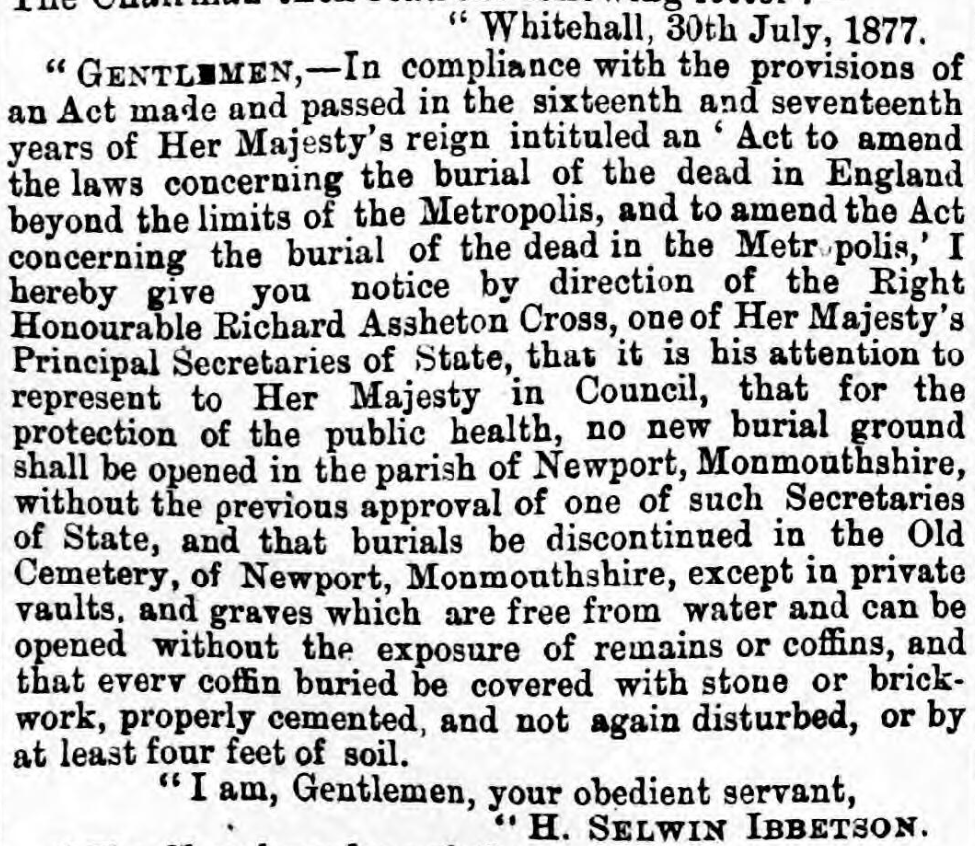

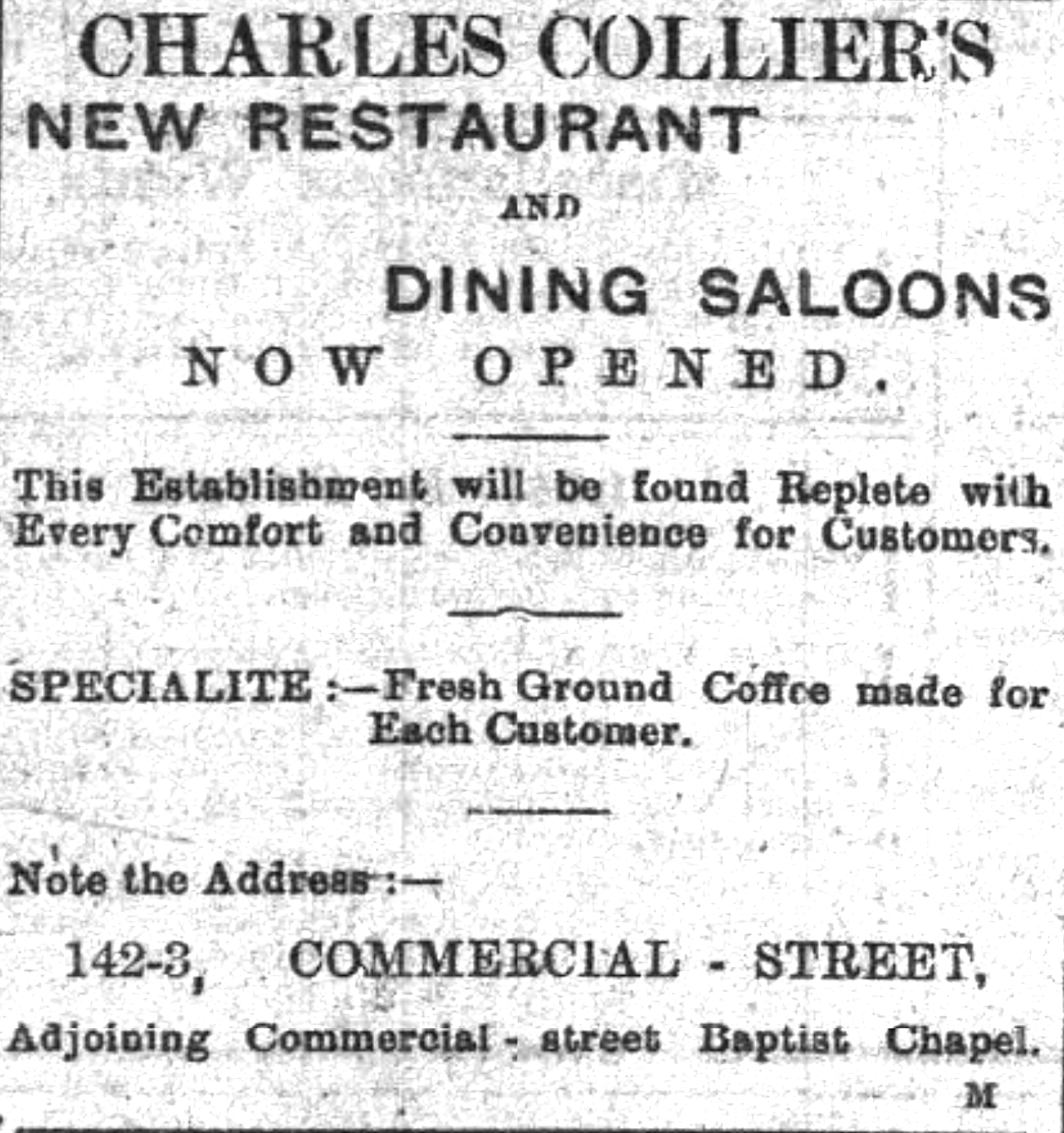

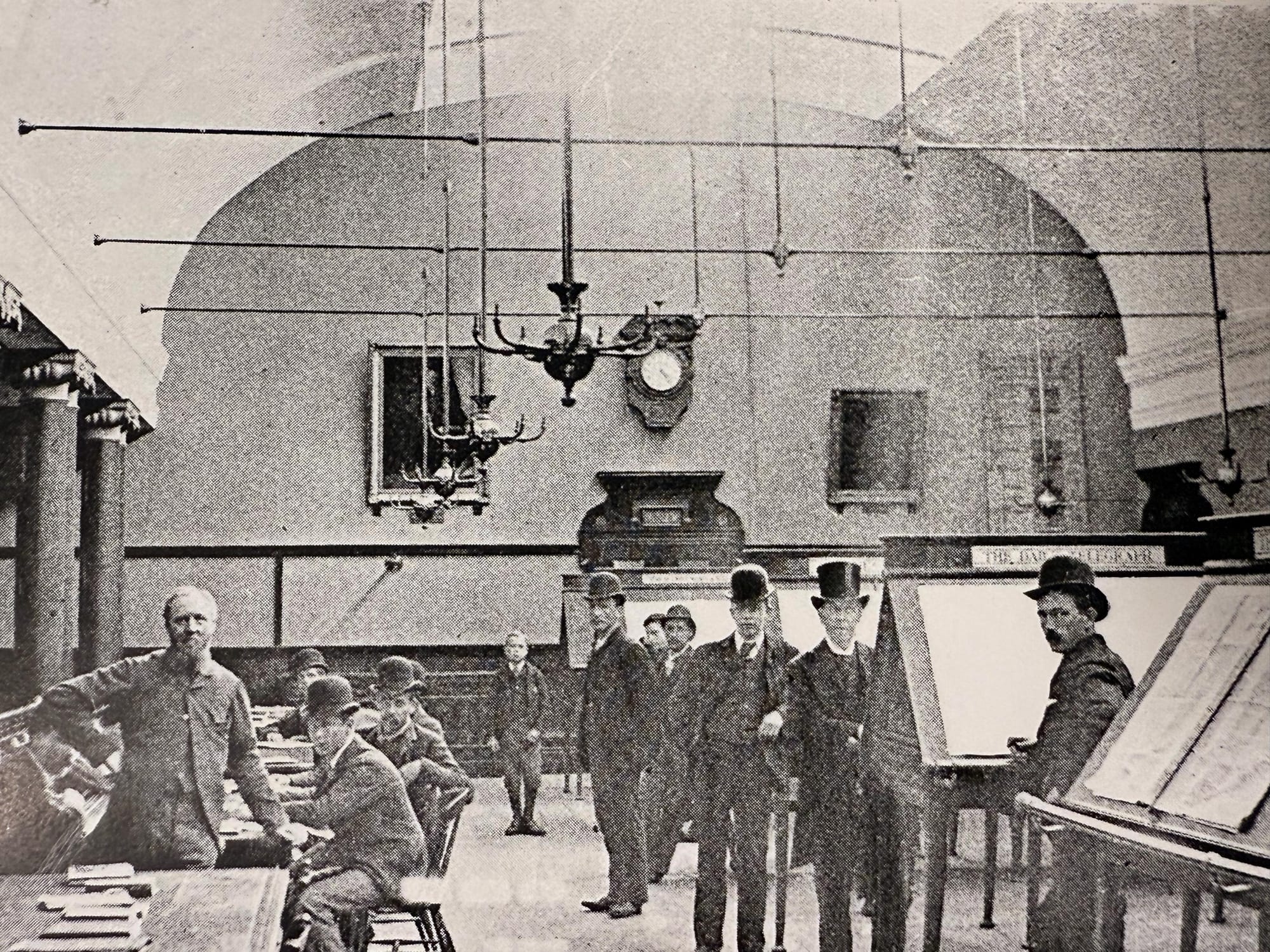

A Pestilential Nuisance
If the discussion which took place at the Newport Town Council meeting last week meant anything to the purpose, it might have been supposed that the reeking nuisance near the bridge, of which such bitter complaints were made, would have been by this time abated or removed.
The Corporation are, in a certain sense, the custodians of the public health, and being so, must be credited with a desire to avoid causes of contamination, and to remove from public thoroughfares whatever would generate malaria, or contribute to disease. It is possible that prompt attention to such a matter as the nuisance we have indicated may be inconvenient; members of the Council may have private engagements upon their hands, and consider that these should have precedence of duties to the public. But such a conclusion is vicious in principle and legally unsound, especially when public health is imperilled.
Our municipal representatives have voluntarily accepted—nay, even sought—the honour of guiding and controlling borough affairs, and allowed themselves to be charged with the responsibility of caring for the public health. Moreover, the case in question is simplified by the consideration that the cause of the pestilential odour near the bridge has been ascertained, and by the fact that it arises from an arrangement carried out under official sanction. We are, of course, far from thinking that when permission was given to the town scavenger to deposit rubbish in the hollow near the river-side, any danger to public health was apprehended indeed, it would appear from the statements of the Town Surveyor, that there existed no ground for such a fear.
Still, what was not apprehended, has nevertheless arisen; and residents in Clarence-place, Barnard Town, and Maindee feel that they have just cause to complain of the noxious smell being allowed to continue. Such complaints have reached as, and we are assured that there has been little or no diminution of the nuisance.
Last week the smell was described as "overpowering," "most offensive," "intensely sickening," &c.
We are told that it was so even yesterday. Are the Public Works Committee aware of this ? If so, we are persuaded they must be anxiously considering what is to be done When shall the persons aggrieved find some fruit of their consultations in a removal of the nuisance?
[Since writing the foregoing we have learned, with satisfaction, that an energetic effort is being made to remove the cause of the foul smell by pumping off the stagnant water. We suppose this will be followed by measures to prevent future accumulation. It is probably too early to judge how far the steps being taken may prove effectual.]
— Monmouthshire Merlin, 22nd June, 1883

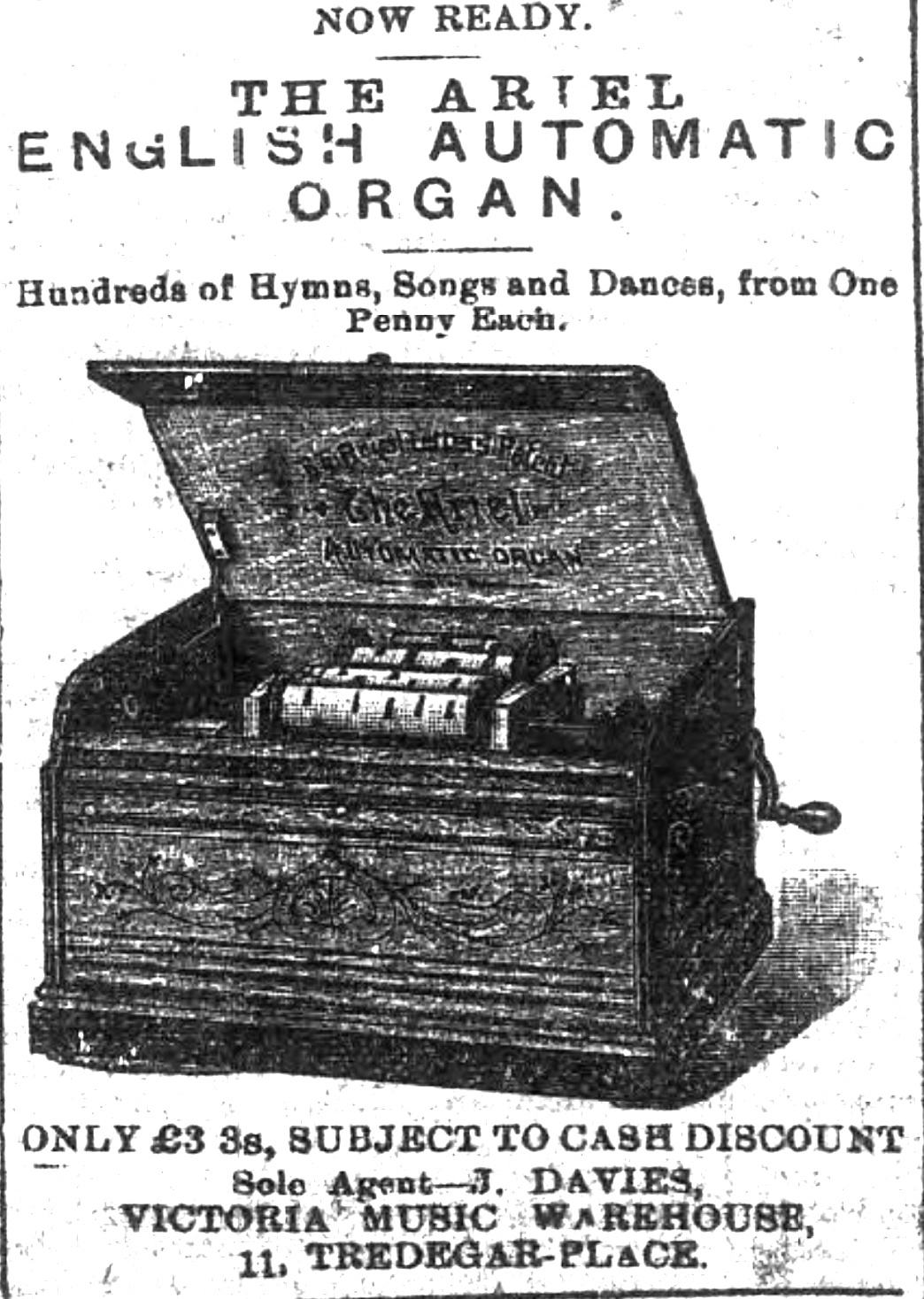

'The Ancient Order of Shepherds at the Marshes'
A deputation from the Ancient Order of Shepherds, consisting of Messrs. Phillipson, H. Witts, and E. Jones waited upon the Board. The Annual Moveable Committee will sit at Newport this year, and the Council have granted the use of the Marshes to the Shepherds for the purpose of a grand fete and gala being held.
Owing to building operations, the Marshes are exposed, a quantity of the boarding having been taken down, and it will be impossible to prevent people gaining entrance without paying if a fence is not erected. The Shepherds offered, if the Corporation intended to erect a permanent fence to subscribe £15 towards it, the amount being the estimate for a temporary fence.
If the Board decided not to erect a permanent fence, then the Shepherds wished for the loan of the boarding which had been taken down. The Council informed the deputation that they did not intend to erect a permanent fence, but that the boarding could be used in erecting a temporary fence.
The sittings of the A.M.C. will be held at the Town-hall. It was decided to lend the Shepherds the letters A.M.C. used in the former illuminations, and such gas piping as the Council possessed. The letters will be illuminated in front of the Town-hall.
— Monmouthshire Merlin, 4th May, 1877

'House For Sale in Clarence Place'
1845, a time when you could buy a house in Clarence Place just 3 minutes walk from the town yet also have miles of uninterrupted views of the countryside.
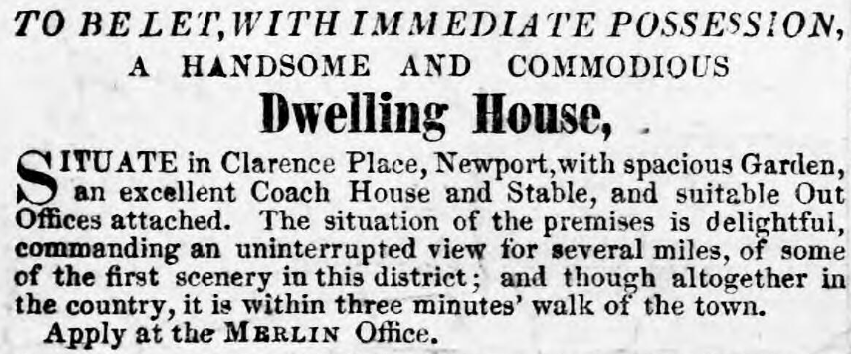

'Where was the 'Celebrated Wall' on Bridge Street?'
At a council meeting in May 1877, a mention was made of a 'celebrated wall' in Bridge Street. But where was that wall?
Alderman Lyne brought up the report of the Works Committee as above. He said that after the last meeting certain members waited on Mr. Carlisle, Lord Tredegar's solicitor, with reference to pulling down that celebrated wall in Bridge-street. They found that personally Mr. Carlisle had no objection to recommending Lord Tredegar to pull down the wall, but for one little fact. There was an old sore between the owners of the Tredegar Estate and that of Clytha, with reference to the Alexandra Dock, a petition against which was lodged by Mr. Herbert, of Clytha, and the land in question was made the great battle field of opposition.
Mr. Carlisle informed them that Lord Tredegar was put to considerable expense by that opposition, and this wall was put up, and they said they did not intend taking it down until the gentleman who put Lord Tredegar to that unnecessary expense had paid the costs, or at least a portion of the costs. Till that was done Mr. Carlisle could not advise Lord Tredegar to pull the wall down. Of course the deputation said they had nothing to do with that, and that they were there simply in behalf of the town of Newport, and that they thought it hard on them that the sins, if they were sins, of Mr. William Graham should be visited on the residents in the neighbourhood, and that therefore they hoped, as representing the public at large, that bygones would be allowed to be bygones, and that the walls of Jericho might be blown down.
However, they spoke without effect so far, but he thought they gathered from Mr. Carlisle that if he could make some satisfactory arrangements and get a part of the expenses, there would be no further obstacle in the way of removing the wall. They. then thanked Mr. Carlisle, who received them, as he always did, in the most courteous manner, and they next waited on Mr. Graham. They pointed out to him how desirable it was for the Clytha Estate that that wall should come down, and also that it would be for the advantage of the public. Mr. Graham promised that he would see Mr. Carlisle with a view of seeing whether some arrangement might not be come to by which the wall would be removed. He hoped very shortly that some arrangement might be come to, and that Mr. Carlisle and Mr Graham might both soon be present at the pulling down of the wall.
— Monmouthshire Merlin, 4th May, 1877

High Street Traffic
The Committee recommend that a police officer should be specially appointed on Saturdays to attend to the traffic in High-street.
— Monmouthshire Merlin, 10th August, 1877

'Entertainment on Friar's Fields Refused'
Taken from a council meeting in July, 1879.
A letter was read from Mr Daniel Lane, requesting the Corporation to allow him to place his shooting gallery, swings, and swing-boat, on Friar's Fields, at £2 per week. The Committee do not recommend that the application be granted. A letter was also received from Messrs Eustace and Co., requesting the Corporation to grant them the use of the Friar's Fields, for the purpose of a marionette show [puppet show], rifle saloon, &c., at a rent of £5 per week. The committee do not recommend that the application be granted.
— Monmouthshire Merlin, 25th July, 1879



The Proposed Widening of High Street
The Corporation of Newport, a short time ago applied for Parliamentary powers to widen the upper portion of High-street, and this (Friday) morning Mr. Harrison, C.E., held an inquiry into the matter at the Town Hall, Newport, when there were present Aldermen Lyne and Llewellin; Councillors L. A. Homfray, H. R. Evans, H. P. Bolt Mr. C. R. Lyne, the Deputy Town Clerk; Mr. Kirby, the Town Surveyor with Mr. James Brown, Mr. J. Warren and other ratepayers.
The notice convening the inquiry having been read, and proof of its proper publication given, the Deputy Town Clerk gave evidence as to the necessity for the proposed widening of High-street. The Town Council had, he said, applied for powers to widen High-street and Inkerman-street, but the Local Government Board had struck out the application for the latter street, because it had not yet been made a public highway.
The upper part of High-street, near the entrance to the Great Western Railway Station was by far too narrow for the requirements of the town, and it was desirable that the street should be widened. At the northern end of the town lay the Great Western Railway Station, together with the suburbs of Maindee and Barnard Town, where a large number of those engaged in business in the borough lived.
The public institutions and the chief business places of the town, were at the Southern end, and the consequence was that a great number of people had to pass to and from their business places to their homes, through High-st. twice a day. The passenger traffic through this street was therefore very considerable.
In addition to this, all vehicles passing to and fro from that end of the town had to pass through this street, and it was frequently blocked owing to this. In the narrowest part the street was at present only 25 feet wide.
Mr Kirby, the Town Surveyor, also gave evidence as to the necessity for widening the street in question. It was proposed, he said, to make it 40 feet wide. In 1876, the number of people, of horses, and of vehicles passing through this street were reckoned,
and it was found that in a single day, 18,740 foot-passengers 1 passed, nearly 1000 horses, and about 800 vehicles.
The population of the town was nearly 40,000. Ald. Lyne, Ald. Llewellin, Mr L. A. Homfray, and Mr H. R. Evans, testified to the necessity for the widening of the street, as it was inadequate for the vehicles, traffic, and dangerous to foot-passengers. It was also pointed out that all the local railway traffic would, in the course of the next twelve months, be concentrated in the High-street Station of the Great Western Railway, (ind the number of people passing through High-street would therefore be greatly increased.
Mr James Brown did not oppose the scheme, but held that the widening of High-street would not be sufficient to meet the requirements of the town. The only remedy, he said, was the obtaining of a new street from Dock-street, for which powers had been granted three years ago. He suggested that the Commissioner should be furnished with a plan of the suggested new street from Tredegar place to the High-street Station, and asked Mr Harrison to visit the places he had mentioned.
Mr Harrison said he did not see that either of the projected new streets would affect the question of widening High-street, as there could be no question as to the desirability of doing that, but he promised to see the places named by Mr Brown.
Mr J. Warren asked whether it would not cost more to widen High-st. and make a new street, than to make High-st a proper street all the way down.
Mr Harrison replied that if powers to widen the street were granted, there would be no restriction as to the number of feet which would be taken in. They might make it 40 or more if they chose.
Mr Bolt said the widening of the narrowest part of High-street would answer all purposes for some years to come, and that would only be continuing what was commenced years ago. The inquiry' then terminated.
— Monmouthshire Merlin, 14th March, 1879

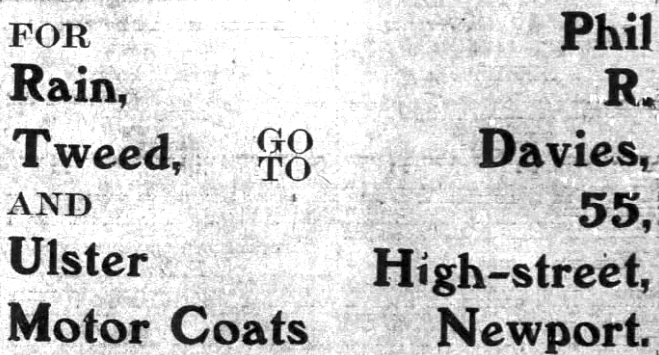


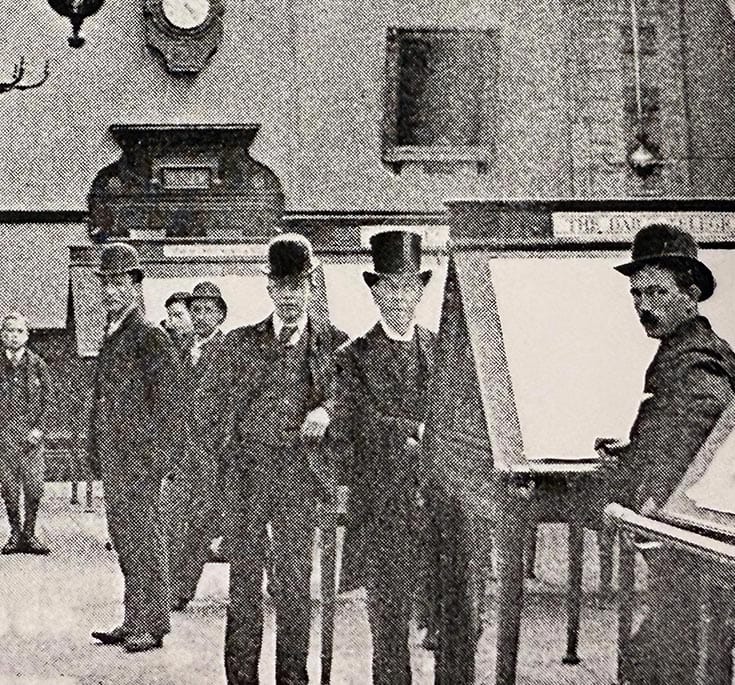
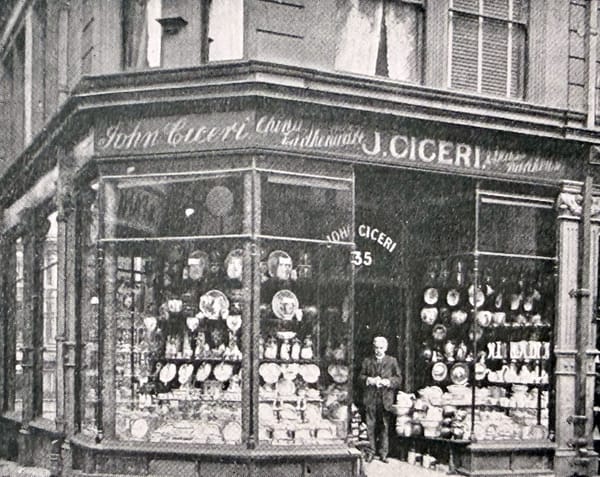
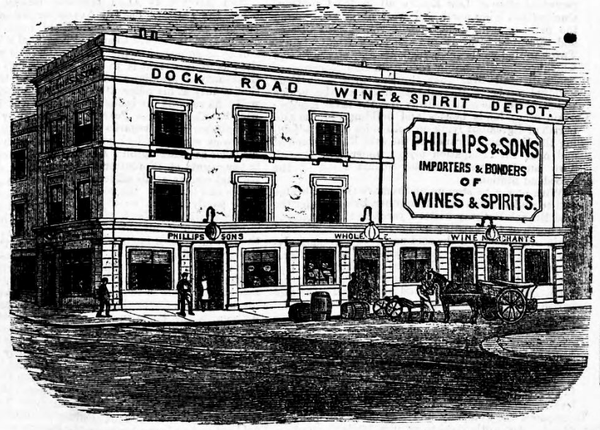
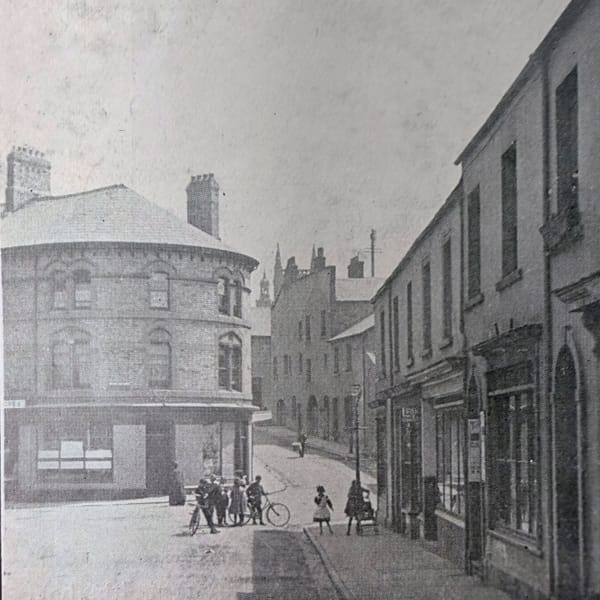
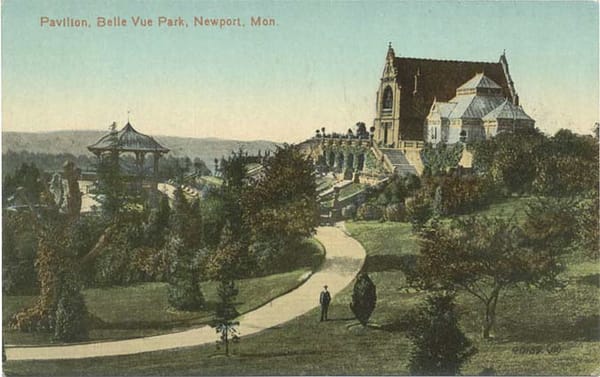
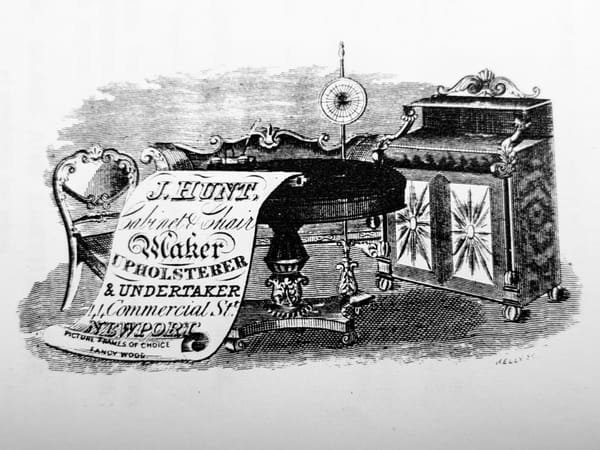
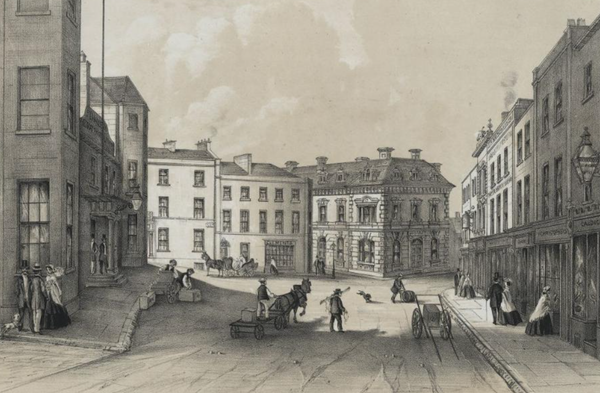
Member discussion